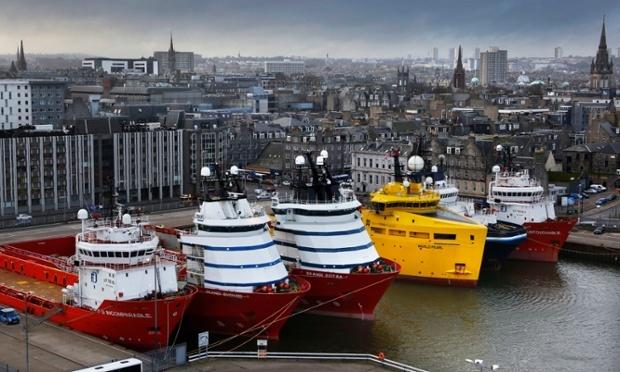
EUROPE'S OIL VICTIM

When he was laid off in December, Sean Murphy thought he would easily find a new job with his 30 years of experience as a supervisor on oil rigs all over Europe's North Sea. Five months and more than 200 résumés later, Mr. Murphy has lost confidence.
So, too, has this once-buoyant city. Often called Europe's energy capital for the high number of oil-and-gas firms operating here, Aberdeen is a victim of the sharp drop in oil prices since last year.
More than 1,000 oil workers have been laid off in the region since the downturn began last year. Local businesses, from taxi cabs to hotels and restaurants, report fewer customers and fear worse is to come. The property market, once one of Britain's hottest, has reversed direction.
"It's like waiting for a tsunami: You can see the wave coming and prepare somewhat, but it's ultimately going to hit you," said Colin Welsh, chief executive of Simmons & Co. International Ltd., an energy-focused investment bank based in Aberdeen.
Across the globe, from Houston to Stavanger in Norway and Perth in Australia, oil cities are nursing their wounds. In the U.S., energy companies, including Halliburton Co. and Baker Hughes Inc., have said they would cut tens of thousands of jobs, many likely in Houston.
In Rogaland, Norway's southernmost fiord county and home of the country's oil capital of Stavanger, the unemployment rate hit 3% in March—tiny by most standards but up from 2.1% a year earlier.
Perth, where about 85,000 work in energy, will see employment growth halve in the coming years and rents fall, says DTZ Research, a consulting firm.
In Aberdeen, Mr. Murphy, a burly, speed-talking Scotsman, went from earning £520 ($819) a week on a rig to £60 on unemployment benefits.
"It's quite an adjustment," Mr. Murphy said, sipping a pint of Guinness in the Regent Bridge pub, a watering hole near the harbor, where half a dozen oil-cargo ships, some the size of three-story buildings, are docked.
While oil prices have rebounded somewhat in recent weeks, they are still down more than 40% since last June. Brent, the global benchmark, is trading around $67 a barrel, down from a high of $115.
But Aberdeen has something else to worry about: Oil in the North Sea is running out. Production has been declining since 1999, and while experts estimate that it still has billions of barrels of oil, sucking them out of the seabed is getting costlier.
The International Monetary Fund estimates that U.K. producers have the highest operating costs in the world, at around $40 a barrel. Costs in Saudi Arabia and Kuwait are around $5 a barrel, the IMF says. It calls the North Sea the world's hardest-hit oil region.
Aberdeen is at the center. It is a city of some 200,000 people, of whom more than 40,000 work in the oil-and-gas industry. More than 900 energy companies are based in the area.
The local chamber of commerce says more than 1,400 job cuts have been announced so far. BP PLC said in January that it would lay off about 300 people in Aberdeen.
Oil's reach here is long. Every morning, a clerk at the Aberdeen Maritime Museum writes down the price of Brent on a small chalk board in the lobby. Taxi drivers offer analysis of the global oil supply and demand balance.
"We are aware of the challenges currently facing the sector, particularly the local economy in and around Aberdeen," Scottish Energy Minister Fergus Ewing said, adding that the government's main goal is "safeguarding the decades of skills and experience" in the local industry.
"There is so much know-how in Aberdeen that we should squeeze more out of our engineers while we still can," said James Bream of the chamber of commerce.
Once a modest fishing and food-processing town, Aberdeen was transformed by the significant oil discoveries in the 1970s. It boasts one of the highest concentrations of millionaires in the country.
The oil riches at the time brought "thousands of Americans from Texas and Louisiana with their cowboy hats and big boots, and money was just thrown at the industry here," recalled Alex Kemp, professor of petroleum economics at the University of Aberdeen. (That influx led to a jump in imports of Southern Comfort liqueur, which was suddenly in heavy demand at local pubs.)
The boom, however, left Aberdeen dependent on oil. A price slump in the 1980s rocked the economy and cost thousands of jobs. "This isn't our first rodeo," Mr. Kemp said.
But short-term price movements are today compounded by the long-term decline of North Sea production. Oil output has dropped about 70% since 1999 to 1.43 million barrels a day last year and is projected to fall below a million in the next decade.
So sharp is the decline that an industry has sprung up around scrapping old rigs, hundreds of which will be shut down in the coming decades.
Still, it isn't all doom and gloom in Scotland's Granite City. Aker Solutions ASA, a Norwegian oil-services company, signed Scotland's largest office-leasing deal last year. And few in the bustling Union Square shopping mall near Aberdeen's harbor seem worried about the city's fortunes.
"The price will go back up soon—until then, hopefully rents will fall a bit," said office assistant Maggie Watson as she pushed her baby in a stroller past the busy Apple Store. "Things will get better, it's all cyclical with oil."
Back in the Regent Bridge, Mr. Murphy isn't prepared to wait. He said he is thinking of leaving his hometown for good.
"I will try my luck in Saudi Arabia or Malaysia, just not in Aberdeen," Mr. Murphy said. "Here, everybody is now looking over their shoulders."
wsj.com


